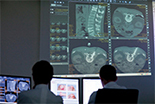New developments in an old discipline

Professor Dr. Fabian Bamberg has been head of the Center for Diagnostic and Therapeutic Radiology at the Medical Center - University of Freiburg since 1 October 2018. The 39-year-old radiologist studied medicine in Germany and the USA. He then worked at the Massachusetts General Hospital of Harvard University in Boston and at the Grosshadern Hospital of Ludwig Maximilian University in Munich. Most recently, he was Deputy Medical Director of Diagnostic and Interventional Radiology at the University Hospital Tübingen.
Professor Bamberg, radiology has developed rapidly in recent years. What are the main changes?
Cutting-edge imaging, such as computed tomography and magnetic resonance imaging, delivers incredibly detailed information to us about pathological processes and functions that we were not able to depict just a few years ago. At the same time, imaging has become much more pleasant for patients: the tubes are larger, the recording time shorter and the radiation exposure lower.
In addition, more and more interventional procedures have been developed in recent years. Patients are treated minimally invasively using radiological methods. The spectrum ranges from the care of chronic inflammation to highly specific localized tumor treatment.
In the largest population study in Germany, the NAKO Health Study, you head the MRI division. What role does radiology play in studying common diseases such as diabetes, dementia and heart disease?
With Magnetic Resonance Imaging (MRI) we have an unrivalled means for early detection of clinically unsuspicious changes. As a result, in the best case, risk constellations can be identified even before the disease breaks out. At the same time, thanks to our radiological insights, we can better understand other factors such as genetic abnormalities.
A project like that generates huge amounts of data, catchword "big data". How do you deal with that?
That's true. As part of the NAKO Health Study, for example, we perform full-body MRI scans on 30,000 participants. That corresponds to more than 6,000 images per person, in total around 180 million images. High data quality is absolutely essential. For this, together with leading epidemiologists in Germany, we are developing suitable methods of increasing the quality and transparency of such studies.
At the same time, the underlying information technology for evaluating data must be further expanded. For example, if we collect several hundred different values in a single examination, we can not rate them all by hand, but need intelligent IT systems. These projects establish standards for how we can employ techniques such as Artificial Intelligence (AI) for radiological image data, and what the prerequisites are for its meaningful use.
We are also in the process of integrating these new intelligent IT systems for diagnostics into our clinical workflows. This is a process, but I am convinced that it will allow us to make even faster, and in some cases more precise, diagnoses.
What medical priorities do you want to set for the near future?
A department for interventional radiology has been established at our hospital, with its own professorship, new rooms and state-of-the-art equipment. In addition, a professorship for cardiothoracic imaging will be established in order to improve heart imaging at the University Heart Center Freiburg • Bad Krozingen. This is a very exciting field, as cardiovascular disease is the number one cause of death. In addition, we will continue to expand our oncological imaging and thus contribute even more to the Comprehensive Cancer Center Freiburg - CCCF.
At the same time, at the Center for Diagnostic and Therapeutic Radiology we will continue our research in order to provide our patients with the latest and best techniques. So we have a lot to do.
What excites you personally about radiology?
Radiology plays a central role in the diagnosis and treatment of almost all diseases, be it in emergency medicine, cancer diagnostics or diagnosing coronary heart disease. Our assessments often form the basis for decisions about treatment. This means a lot of responsibility toward the patient, and it requires interdisciplinary cooperation.
Back